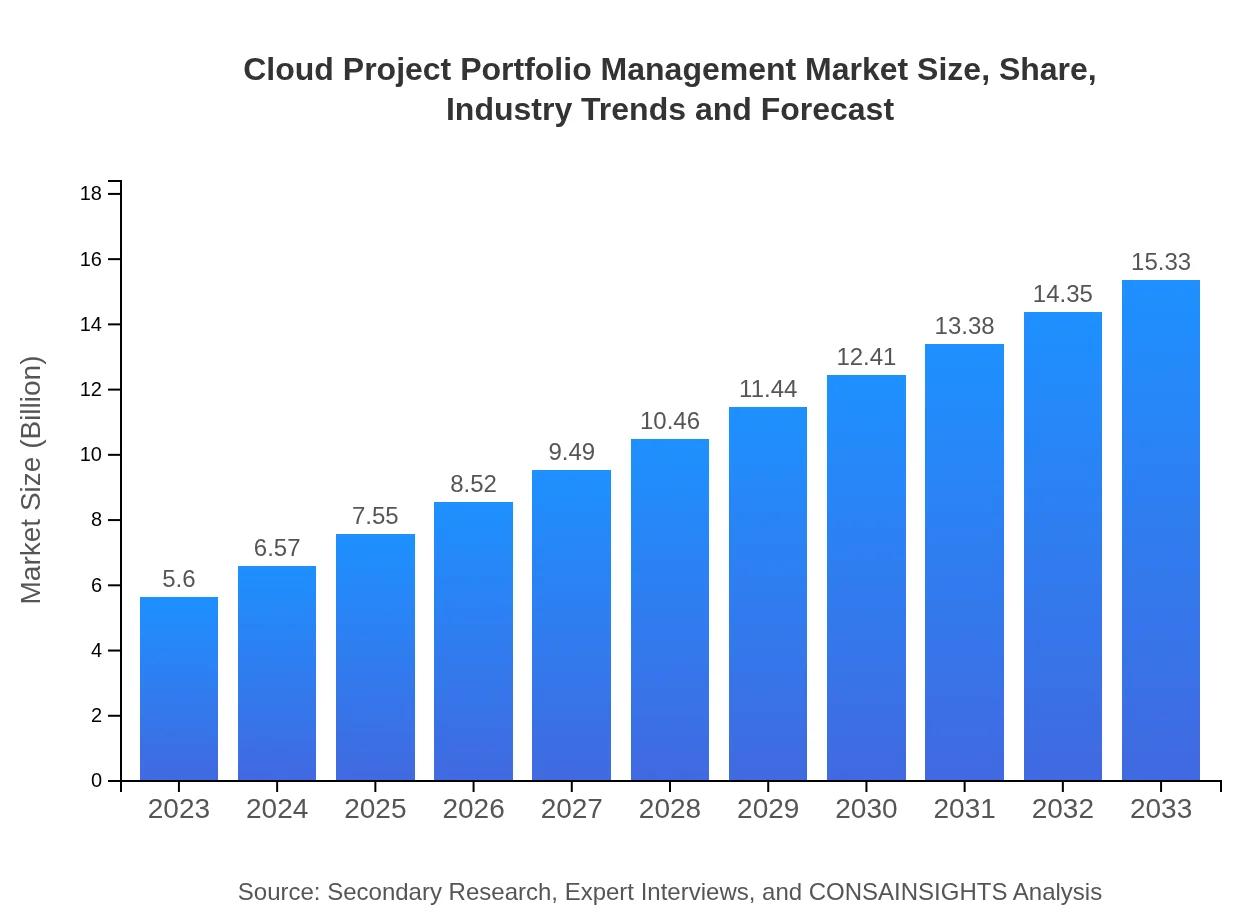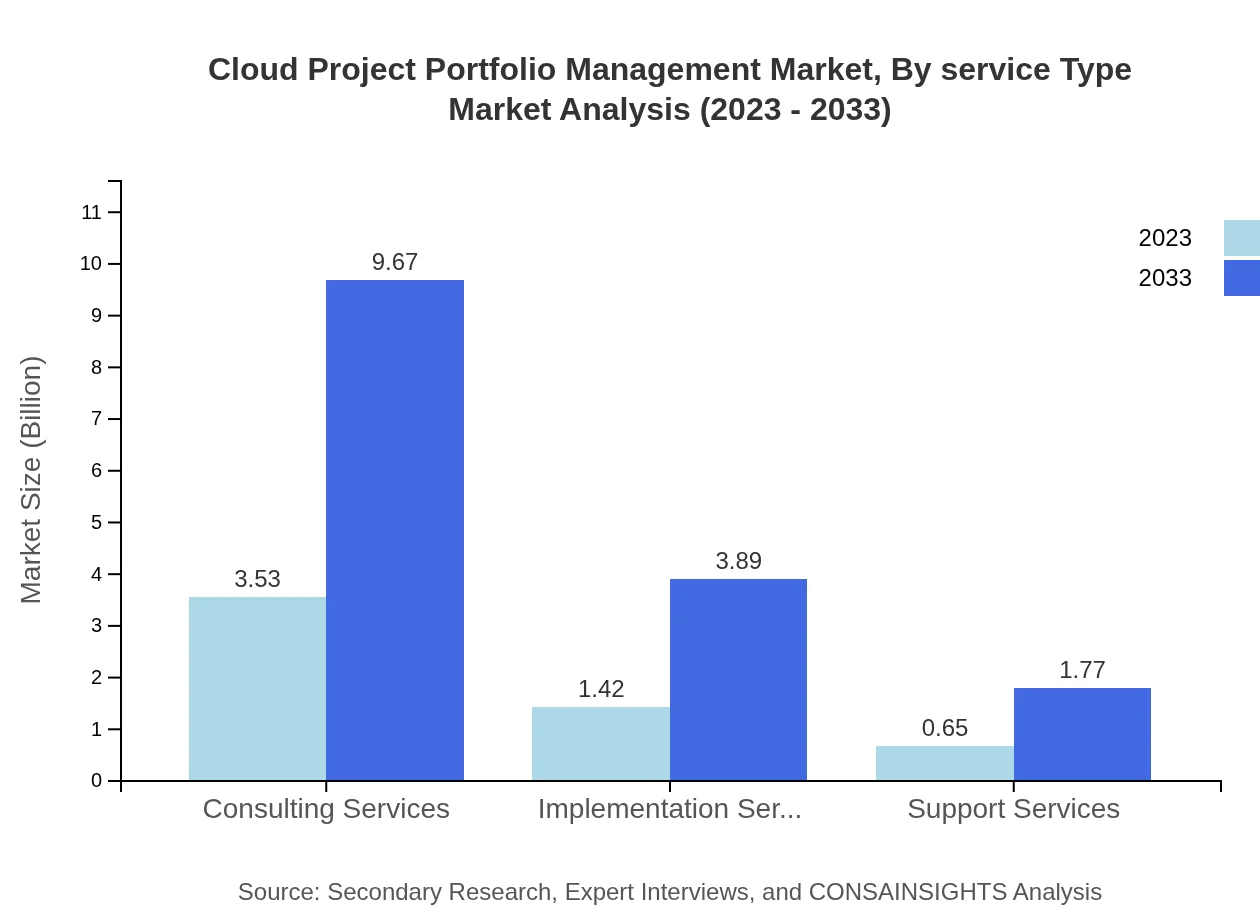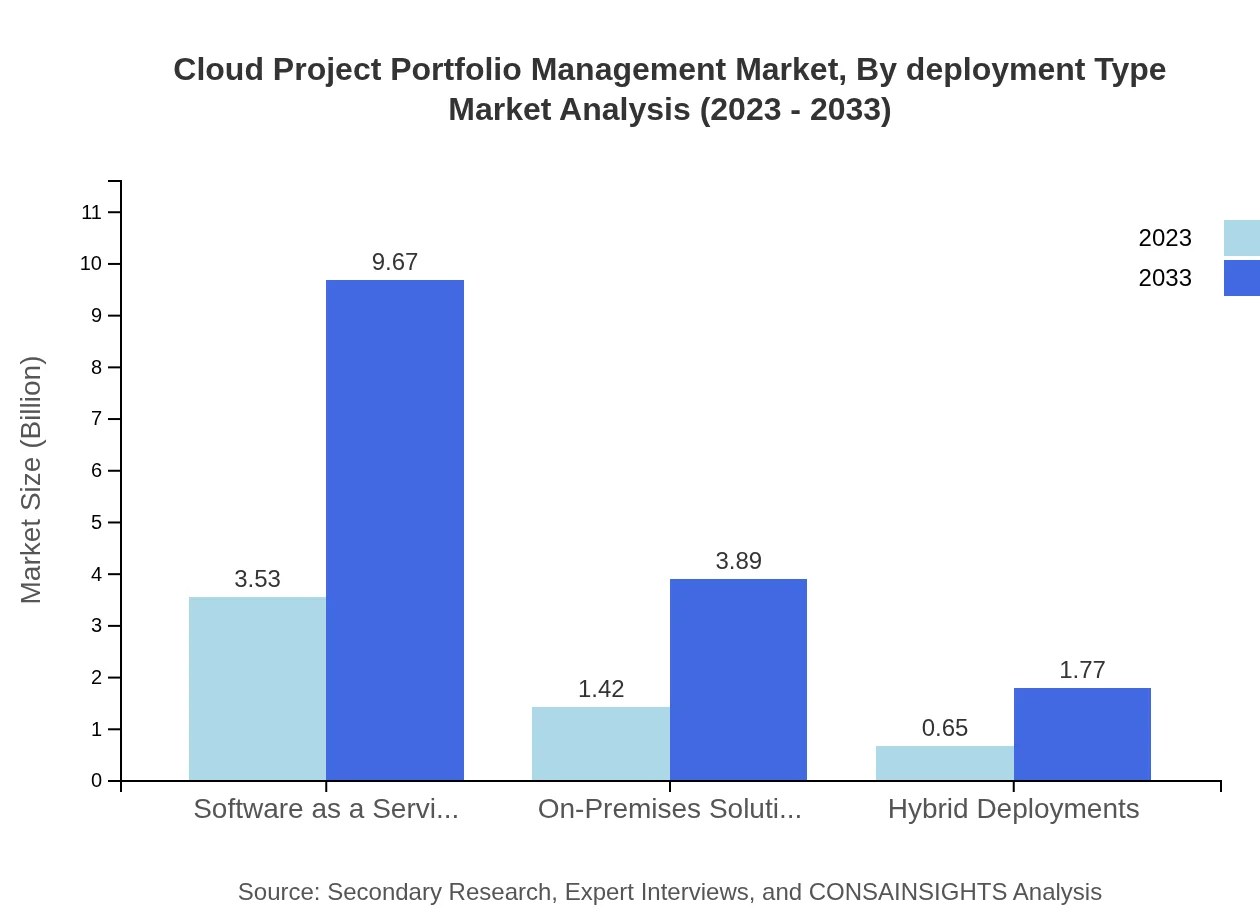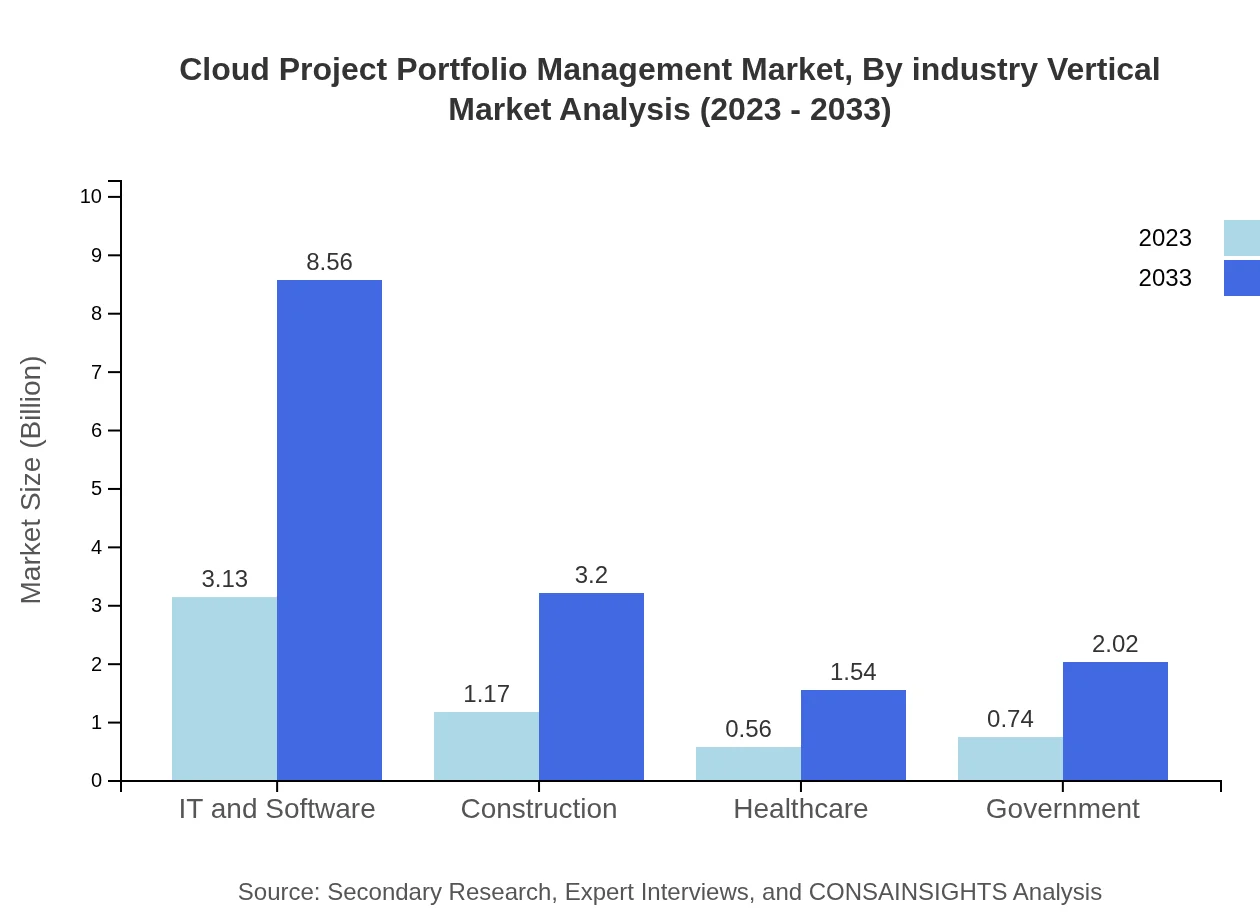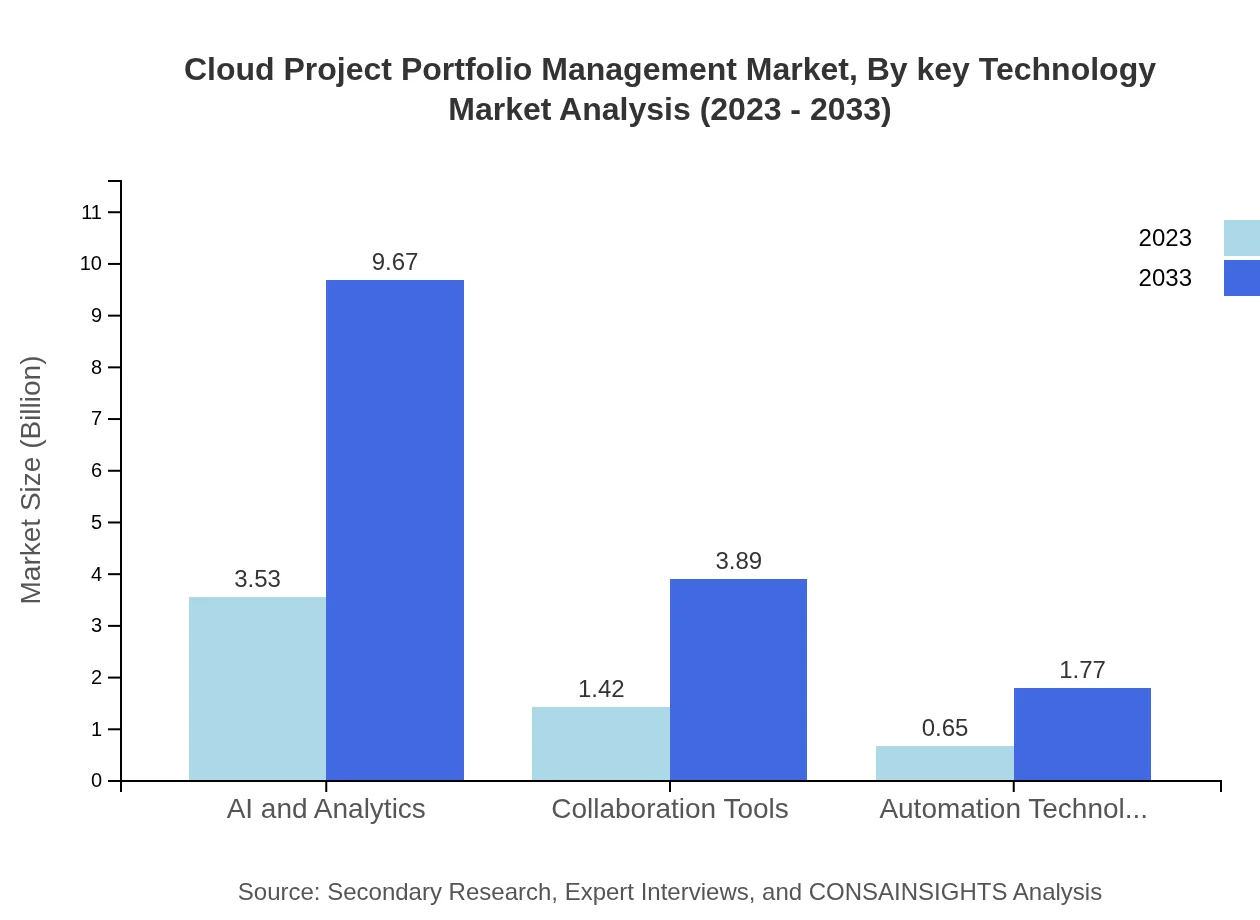Cloud Project Portfolio Management Market Report
Published Date: 22 January 2026 | Report Code: cloud-project-portfolio-management
Cloud Project Portfolio Management Market Size, Share, Industry Trends and Forecast to 2033
This report provides a comprehensive analysis of the Cloud Project Portfolio Management market, offering insights into market dynamics, segment performance, regional analysis, and future forecasts for 2023 to 2033.
| Metric | Value |
|---|---|
| Study Period | 2023 - 2033 |
| 2023 Market Size | $5.60 Billion |
| CAGR (2023-2033) | 10.2% |
| 2033 Market Size | $15.33 Billion |
| Top Companies | Oracle Corporation, Microsoft, Smartsheet, Asana, Trello |
| Last Modified Date | 22 January 2026 |
Cloud Project Portfolio Management Market Overview
Customize Cloud Project Portfolio Management Market Report market research report
- ✔ Get in-depth analysis of Cloud Project Portfolio Management market size, growth, and forecasts.
- ✔ Understand Cloud Project Portfolio Management's regional dynamics and industry-specific trends.
- ✔ Identify potential applications, end-user demand, and growth segments in Cloud Project Portfolio Management
What is the Market Size & CAGR of Cloud Project Portfolio Management market in 2023?
Cloud Project Portfolio Management Industry Analysis
Cloud Project Portfolio Management Market Segmentation and Scope
Tell us your focus area and get a customized research report.
Cloud Project Portfolio Management Market Analysis Report by Region
Europe Cloud Project Portfolio Management Market Report:
The European market, valued at approximately $1.52 billion in 2023, is projected to reach $4.17 billion by 2033. Regulatory support and focus on digital transformation are instrumental in this expansion.Asia Pacific Cloud Project Portfolio Management Market Report:
In 2023, the Asia Pacific market is valued at $1.18 billion, expected to reach $3.24 billion by 2033. Notable growth drivers include increasing digitalization and the demand for collaborative project management tools among emerging economies.North America Cloud Project Portfolio Management Market Report:
With a market size of $1.81 billion in 2023, North America will likely see growth to $4.96 billion by 2033. The presence of major tech companies and high adoption rates of cloud solutions for project management largely contribute to this growth.South America Cloud Project Portfolio Management Market Report:
The South America market stands at $0.54 billion in 2023, growing to $1.47 billion by 2033. The rise in cloud adoption and the need for effective project management methodologies are notable in this region.Middle East & Africa Cloud Project Portfolio Management Market Report:
The Middle East and Africa region's market is expected to grow from $0.55 billion in 2023 to $1.49 billion by 2033, driven by rising investments in IT infrastructure and cloud technologies.Tell us your focus area and get a customized research report.
Cloud Project Portfolio Management Market Analysis By Service Type
Consulting Services, valued at $3.53 billion in 2023 and projected to grow to $9.67 billion by 2033, dominate the market due to high advisory needs. Implementation Services are valued at $1.42 billion, expected to reach $3.89 billion. Support Services begin at $0.65 billion with a projected rise to $1.77 billion.
Cloud Project Portfolio Management Market Analysis By Deployment Type
Software as a Service (SaaS) is the leading deployment type, valued at $3.53 billion in 2023, projected to rise to $9.67 billion by 2033. On-Premises Solutions are expected to grow from $1.42 billion to $3.89 billion, while Hybrid Deployments increased from $0.65 billion to $1.77 billion over the same timeframe.
Cloud Project Portfolio Management Market Analysis By Industry Vertical
In 2023, IT and Software lead the industry vertical segment at $3.13 billion, expected to grow to $8.56 billion. Construction follows at $1.17 billion, targeting a size of $3.20 billion, while healthcare and government sectors also show significant growth trajectories.
Cloud Project Portfolio Management Market Analysis By Key Technology
AI and analytics are set to make significant impacts, with current valuations reflecting a market size of $3.53 billion in 2023, expected to rise to $9.67 billion. Automation technologies and collaboration tools provide essential support to businesses, complementing the primary growth drivers.
Cloud Project Portfolio Management Market Trends and Future Forecast
Tell us your focus area and get a customized research report.
Global Market Leaders and Top Companies in Cloud Project Portfolio Management Industry
Oracle Corporation:
Offers a comprehensive PPM cloud solution that supports various project methodologies and integrates analytics and AI to streamline processes.Microsoft:
Provides Project for the web, a powerful cloud-based solution integrated with Microsoft Teams, facilitating enhanced collaboration among project stakeholders.Smartsheet:
Known for its user-friendly interface and project collaboration features, Smartsheet is widely adopted by organizations for effective project portfolio management.Asana:
A leading project management tool that provides a cloud-based platform for teams to plan, execute, and collaborate effectively on projects.Trello:
Utilizes a visually appealing Kanban-style approach in project management, enhancing user engagement and facilitating easy tracking of project progress.We're grateful to work with incredible clients.









FAQs
What is the market size of cloud Project Portfolio Management?
The global Cloud Project Portfolio Management market is valued at approximately $5.6 billion in 2023, with a projected CAGR of 10.2%. This significant growth indicates increasing adoption of cloud solutions in project management sectors.
What are the key market players or companies in this cloud Project Portfolio Management industry?
Key players in the Cloud Project Portfolio Management industry include Microsoft, Monday.com, Smartsheet, Wrike, and ServiceNow. These companies are recognized for their innovative solutions and robust market presence, continually shaping industry trends.
What are the primary factors driving the growth in the cloud Project Portfolio Management industry?
Factors driving growth include the increasing demand for flexibility in project management, the rise of remote work, and enhanced collaboration tools. Additionally, advancements in AI and data analytics are transforming decision-making processes in project portfolios.
Which region is the fastest Growing in the cloud Project Portfolio Management?
The Asia Pacific region is projected to grow rapidly, expanding from $1.18 billion in 2023 to about $3.24 billion by 2033. This growth is fueled by increasing digital transformation initiatives across various industries in this region.
Does ConsaInsights provide customized market report data for the cloud Project Portfolio Management industry?
Yes, ConsaInsights offers customized market report data tailored to specific needs within the Cloud Project Portfolio Management industry. This includes detailed analysis, forecasts, and insights relevant to individual market segments and competitive landscape.
What deliverables can I expect from this cloud Project Portfolio Management market research project?
Deliverables include comprehensive market reports featuring trends, growth forecasts with segmentation data, competitive analysis, and strategic recommendations. These insights aim to guide business decisions and investment strategies within the market.
What are the market trends of cloud Project Portfolio Management?
Current trends in Cloud Project Portfolio Management include the merger of AI technologies, an increase in SaaS adoption, and a shift towards hybrid deployment models. Furthermore, there's a growing emphasis on consulting services to optimize project outcomes.

